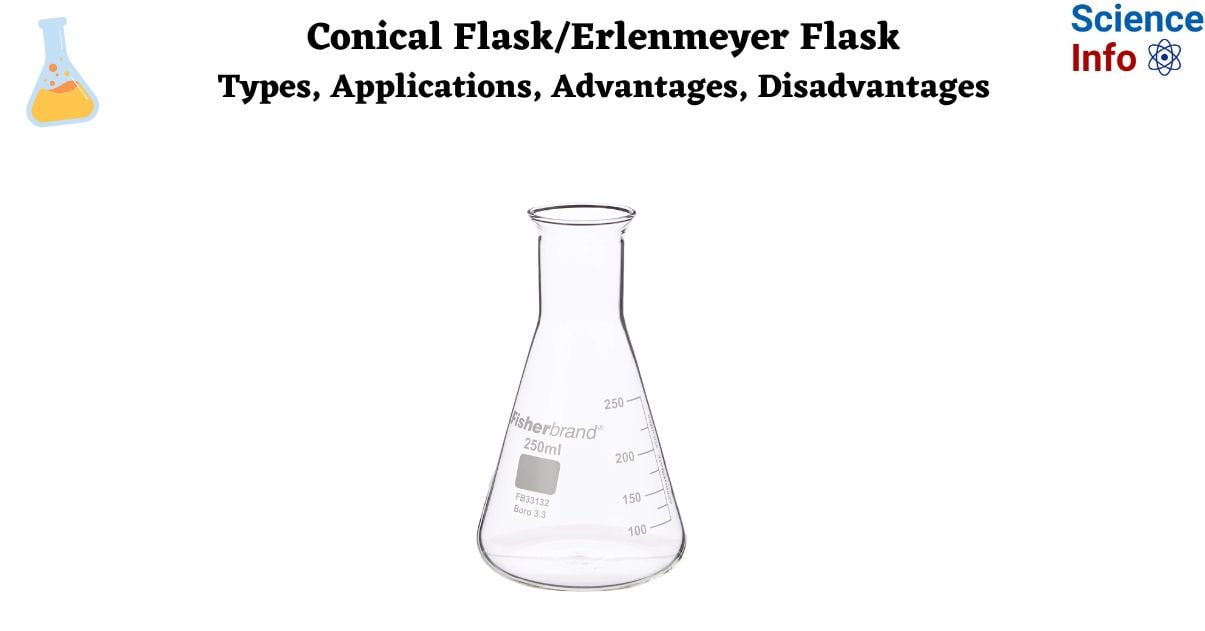A conical flask, commonly known as an Erlenmeyer flask, is a type of laboratory plasticware used for mixing, stirring, and heating tiny volumes of liquid samples. It features a cylindrical shape with a flat bottom and a conical neck. Conical flasks are widely used in laboratories, hospitals, and the pharmaceutical sector for a variety of purposes, including reagent preparation, DNA or protein extraction, and microbe cultivation. They are available in a variety of sizes and configurations to satisfy a wide range of research and diagnostic applications. Conical flasks are frequently used in conjunction with other laboratory equipment such as balances, beakers, and test tubes to handle and process small amounts of material.

Interesting Science Videos
What is Conical Flask/ Erlenmeyer Flask?
An Erlenmeyer flask, also known as a conical flask, is a common type of laboratory glassware used in a variety of scientific experiments. A conical flask is typically made of borosilicate glass, which resists chemical damage and temperature changes.
It features a conical shape with a slender neck and a flat, spherical base. A graduated scale for approximate volume measurements is commonly found on the neck. Emil Erlenmeyer (1825-1910), a German chemist, invented it in 1860 and named it for himself. Erlenmeyer’s flasks are used to prepare concentration solutions and conduct chemical analyses. It is typically used in the titration method and so known as a “Titration Flask.”
This flask’s unique shape allows it to be sealed with a stopper for heating while yet enabling the researcher to swirl while testing. The flask’s tapered edges and narrow neck allow liquids to mix and swirl freely without spilling.
Types of Conical Flask
Conical flasks are classified into two types: narrow-mouth and wide-mouth.
Conical Flask with Narrow Mouth
Use: Filter funnels are supported by these flasks, which are made especially for use in investigations that need for filtration.
Functionality: When you need to direct a liquid through a filter without spilling, the narrow opening is helpful. It aids in accurately directing the liquid into the funnel, enabling regulated filtering.
Mixing Solutions: The flask’s form makes it simple to swirl in order to combine solutions. To guarantee complete mixing without the need for extra stirring tools, swirling is a popular technique.
Conical flask with a wide mouth
Use: This kind of flask is used in investigations when stirring is required.
Functionality: The larger opening makes it easier to insert stirring rods or other tools to thoroughly mix the liquids inside the flask. This is especially helpful when a more vigorous or precise mixing is needed.
Mixing Solutions: When an experiment calls for the use of a stirring rod or other equipment to properly agitate the contents, wide-mouth flasks are frequently used.
Applications of Conical Flask
Bacteriology Labs: In bacteriology labs, conical flasks can be used for developing culture medium, growing bacterial cultures, and carrying out investigations pertaining to the growth and analysis of bacteria, among other things.
Hematology Laboratories: Conical flasks can be used in hematology labs for a variety of purposes, such as manufacturing chemicals, diluting blood samples, or streamlining particular procedures linked to the examination of blood cells and constituents.
Microbiology Laboratories: In microbiology labs, conical flasks are necessary for operations such as growing microorganisms, creating growth media, and performing microbial growth and behavior investigations.
General Laboratory Applications: Conical flasks are frequently employed in general laboratory applications for a variety of purposes, such as heating or chilling liquids, mixing solutions, and performing other experiments that call for precise swirling or stirring.
Clinical chemistry procedures: Conical flasks can be used in clinical chemistry labs to prepare and mix reagents, carry out chemical studies, and carry out tasks linked to clinical diagnosis.
Labs for Research and Development: Conical flasks are essential to many scientific disciplines’ research and development centers. Reaction mixes, solution preparations, and experimental setups are just a few of the many uses for them.
Advantages of Conical Flasks
Conical flasks are versatile laboratory tools used for various purposes, including titration, boiling, mixing, heating, cooling, recrystallization, short-term storage, and research involving chemical probes and sensors. Their design features, such as the wide body, narrow neck, and material composition, make them essential for tasks involving liquids and solutions in chemical research.
- Conical flasks, especially Erlenmeyer flasks, with their irregular shape, are ideal for swirling liquids, making them well-suited for titration experiments. The shape facilitates controlled mixing and ensures accurate titration results.
- Conical flasks are used for boiling liquids in laboratory processes. The top of the Erlenmeyer flask aids in condensing the solvent, and the narrow neck helps reduce solvent loss during the boiling process.
- Conical flasks are commonly employed in chemical research for medical science or industry for heating and cooling solutions. Made of materials like Pyrex or borosilicate glass, they are less susceptible to cracking during extreme temperature changes.
- The narrow neck of conical flasks is advantageous in reducing solvent loss during recrystallization processes. This feature enhances the capability of recrystallization and ensures efficient recovery of substances.
- Conical flasks are suitable for short-term storage of solutions. Their design allows for easy sealing if necessary, providing a convenient option for temporarily storing prepared solutions.
- Conical flasks find applications in research involving testing accessories such as chemical probes and sensors. Chemical probes, used in the study and manipulation of biological systems, can be employed in conjunction with conical flasks to observe and alter the function of biological targets.
- In laboratory settings, conical flasks are often used with serological pipettes for the precise transfer of small amounts of liquid between flasks. This allows for controlled additions or transfers during experiments.
Disadvantages of Conical Flask
- This flask is not used for measurement, as its main purpose is to mix and store liquids. The flask is not appropriate for measuring because of its uneven shape. Only gathering and storing objects is the purpose of the flask
- Because of its restricted thickness, it is not suitable for high-temperature chemical reactions.
- Improper handling can quickly cause it to break or get damaged.
- Uneven heat dispersion during heating processes can be caused by the design of conical flasks. Particularly in investigations where accurate and consistent temperature control is essential, this unevenness can impact the consistency of responses.
- There may be difficulties while cleaning conical flasks because of their tiny neck. When working with materials that have a tendency to stick or solidify, it could be difficult to clean and dry the interior completely.
Video on Conical Flask
References
- https://www.glasscolabs.com/product-category/laboratory-glassware/laboratory-glasswares-flasks/conical-flask/
- https://mbpinc.net/erlenmeyer-flask-and-filter-flasks-usage-benefits-and-drawbacks/
- https://www.sentek.co.uk/conical-flask-uses/
- https://microbiozindia.com/the-ultimate-guide-to-conical-flasks-everything-you-need-to-know/
- https://microbeonline.com/conical-flask/#Applications_of_the_Conical_Flask

